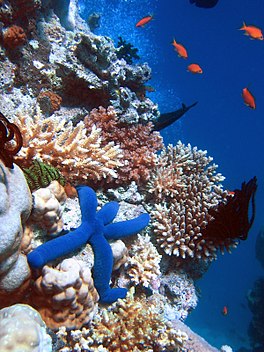
Back حفظ البيئة البحرية Arabic Meeresschutz German Conservación marina Spanish حفاظت دریایی Persian Merten suojelu Finnish സമുദ്രസംരക്ഷണം Malayalam Conservação marítima Portuguese Mbrojtja e burimeve detare Albanian การอนุรักษ์ทางทะเล Thai

| Part of a series of overviews on |
| Marine life |
|---|
 |
Marine conservation, also known as ocean conservation, is the protection and preservation of ecosystems in oceans and seas through planned management in order to prevent the over-exploitation of these marine resources. Marine conservation is informed by the study of marine plants and animal resources and ecosystem functions and is driven by response to the manifested negative effects seen in the environment such as species loss, habitat degradation and changes in ecosystem functions[1] and focuses on limiting human-caused damage to marine ecosystems, restoring damaged marine ecosystems, and preserving vulnerable species and ecosystems of the marine life. Marine conservation is a relatively new discipline which has developed as a response to biological issues such as extinction and marine habitats change.
Marine conservationists rely on a combination of scientific principles derived from marine biology, Ecology, oceanography, and fisheries science, as well as on human factors, such as demand for marine resources, maritime law, economics, and policy, in order to determine how to best protect and conserve marine species and ecosystems. Marine conservation may be described as a sub-discipline of conservation biology.
© MMXXIII Rich X Search. We shall prevail. All rights reserved. Rich X Search